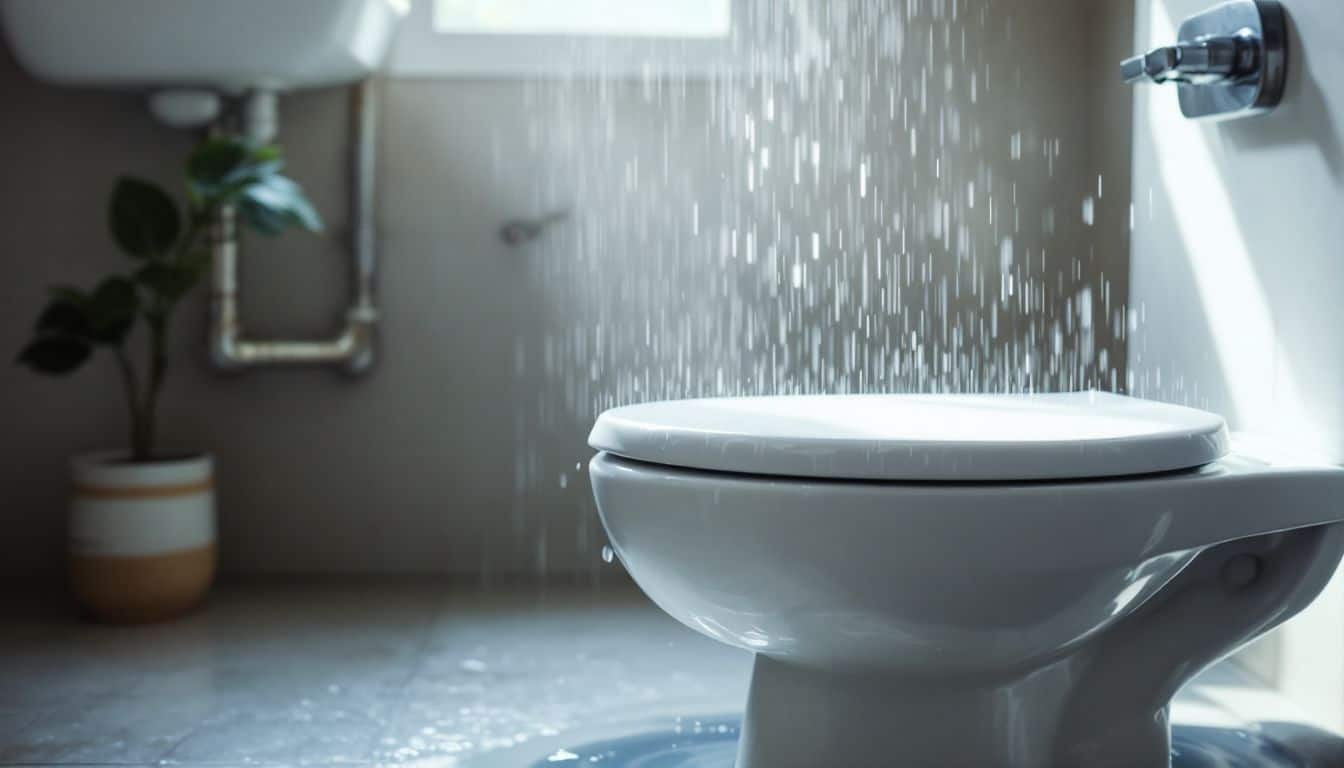Ever noticed water pooling around your toilet or heard strange noises from your pipes? These warning signs might point to serious plumbing problems that could damage your home. Knowing when to call a plumber can save you thousands in costly repairs and prevent major headaches down the road.
Here’s your no-nonsense guide to 12 red flags that scream “call a pro now!”
Key Takeaways
Call a plumber right away if you notice multiple slow drains, gurgling pipes, or complete loss of water pressure – these signs often point to serious main line clogs that can release up to 250 gallons per hour if pipes burst.
Don’t ignore running toilets or bad smells from drains, as they waste money through high water bills and signal deeper plumbing issues like broken flapper valves, empty P-traps, or dangerous sewer gas leaks.
Basic tools like plungers can’t fix major problems such as foreign objects in toilets, mineral buildup, or main sewer line clogs – attempting DIY fixes on these issues often leads to worse damage and higher repair costs.
Watch for water pooling around toilet bases, strange noises from pipes, and weak water pressure (below 40-100 psi range) – these warning signs need expert attention to prevent flooding and expensive water damage to your home.
Regular maintenance from a professional plumber helps catch problems early and prevents emergency situations like burst pipes, backflow issues, and overflowing toilets that can damage your home’s plumbing system.
Table of Contents
Common Reasons to Call a Plumber

Your plumbing system talks to you – and sometimes it screams for help. From mysterious banging in your pipes to water that moves slower than a snail, these signs mean your pipes need a pro’s touch.
Slow Drain Issues
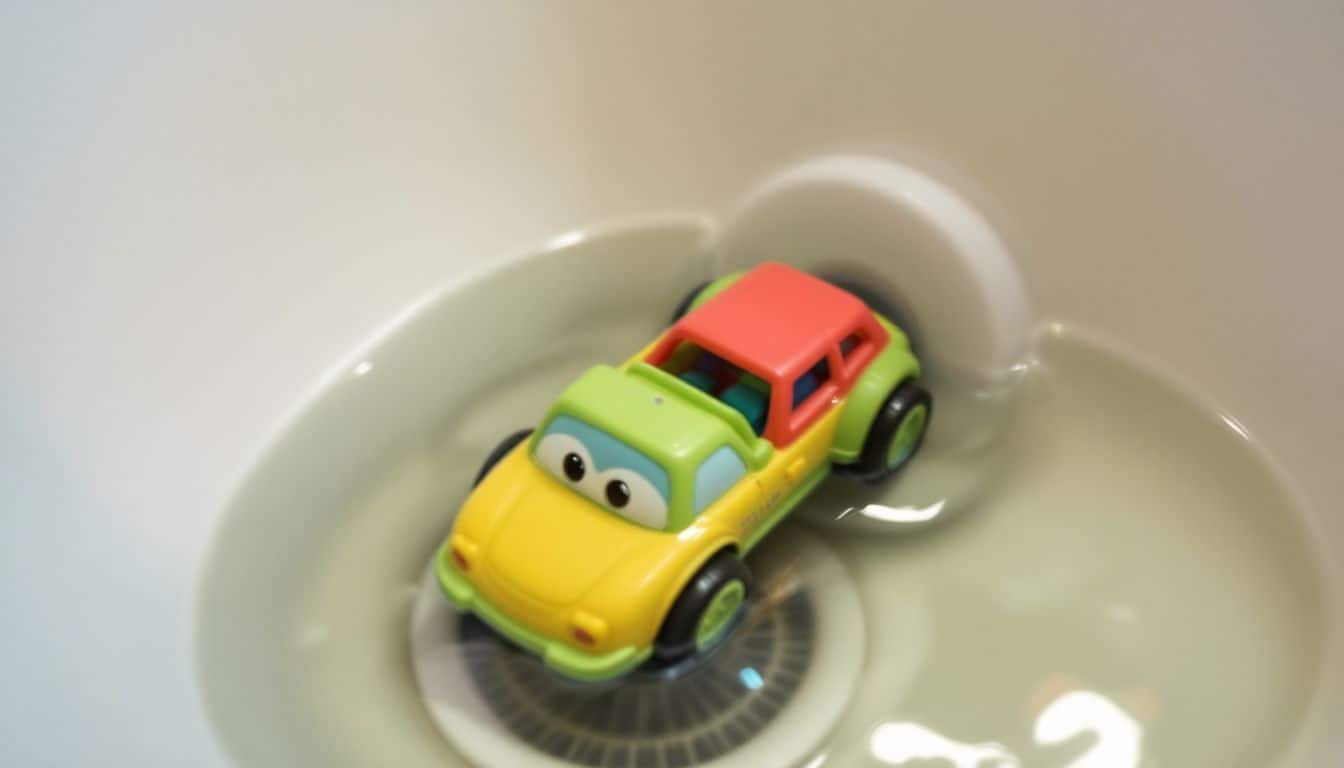
Slow drains spell trouble for your home’s plumbing system. Water pooling in sinks or showers points to nasty clogs hiding in your pipes. According to some Tucson plumbers we interviewed, these blockages often come from food waste, hair, and random objects that slip down drains.
I learned this the hard way after my kid’s toy car created a massive clog last summer.
Fixing slow drains quickly saves you from sky-high water bills and bigger headaches later. Simple drain cleaners might help, but recurring clogs need a pro’s touch. Watch out for bubbling water or puddles around drain areas – these signal serious blockages that could mess up your whole plumbing setup.
Regular drain cleaning keeps things flowing smoothly, but you’ll need expert help if basic fixes don’t work.
Weak Water Pressure

After fixing drain clogs, you might notice another common plumbing headache – weak water pressure. Your morning shower shouldn’t take forever to rinse off shampoo. Normal water pressure sits between 40 and 100 psi for proper home water flow.
A drop below this range signals trouble in your plumbing system.
Low pressure is like trying to drink a milkshake through a coffee stirrer – frustrating and time-consuming.
Several culprits create this annoying issue. Mineral buildup in pipes often blocks water flow, especially if you have a water softener problem. Debris can clog your faucet aerator, making water trickle instead of flow.
Your pressure regulator might have failed, or hidden leaks could steal your water pressure. I once found my basement flooded because a tiny pipe crack drained pressure from my entire first floor.
The water meter valve sometimes gets stuck too, cutting off proper flow to your home.
Serious Backflow Problems
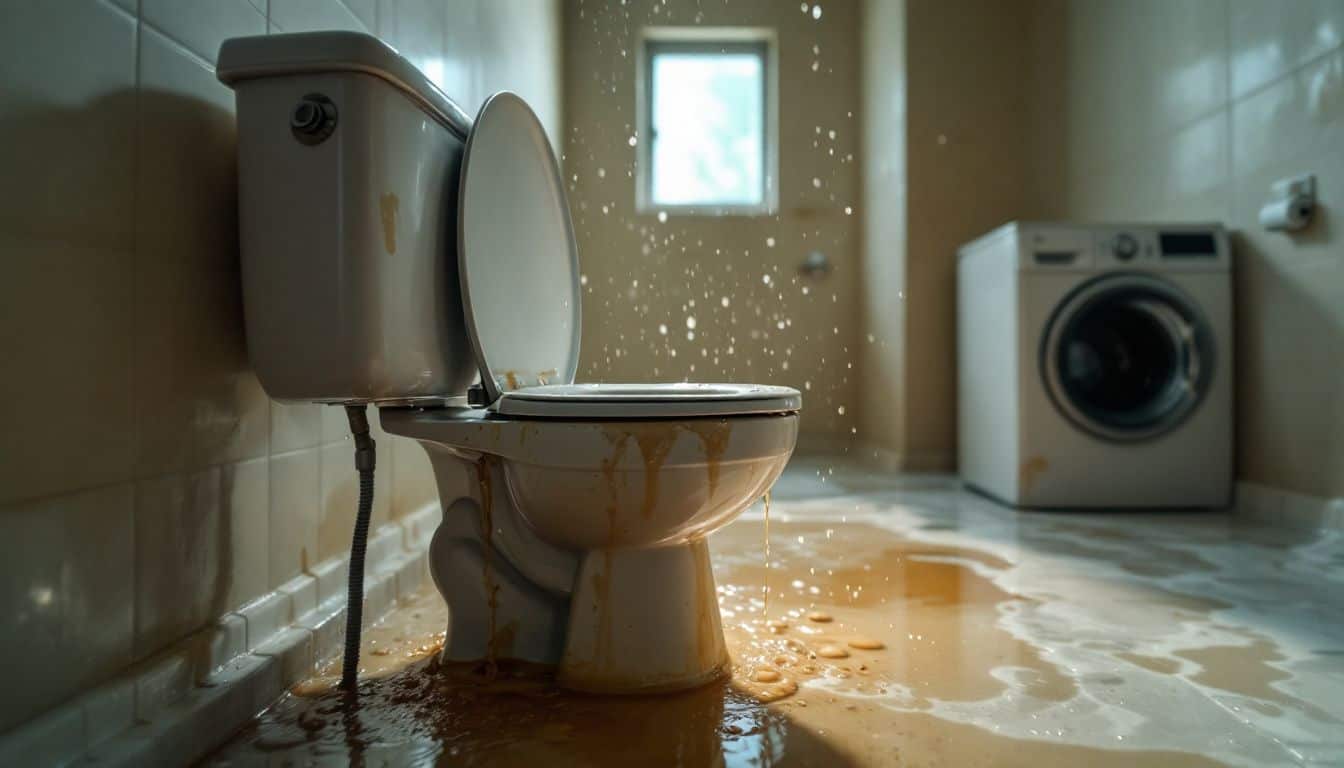
Backflow problems spell serious trouble for your home’s plumbing system. Contaminated water can flow back into your clean water supply when pressure drops in your main water line. I’ve seen this happen in countless homes – dirty water from toilets, sinks, or even your washing machine pushing back into your drinking water.
This creates a major health risk for you and your family.
Your toilet will give you clear signs of backflow issues. Listen for gurgling sounds when you flush – that’s your pipes crying for help. You might also spot water backing up in weird places, like your bathtub when you run the washing machine.
Bad drain vents often cause these problems too. Don’t try to fix backflow issues yourself – they need a professional plumber’s expertise to protect your home’s water supply and your family’s health.
Gurgling Sounds in Pipes
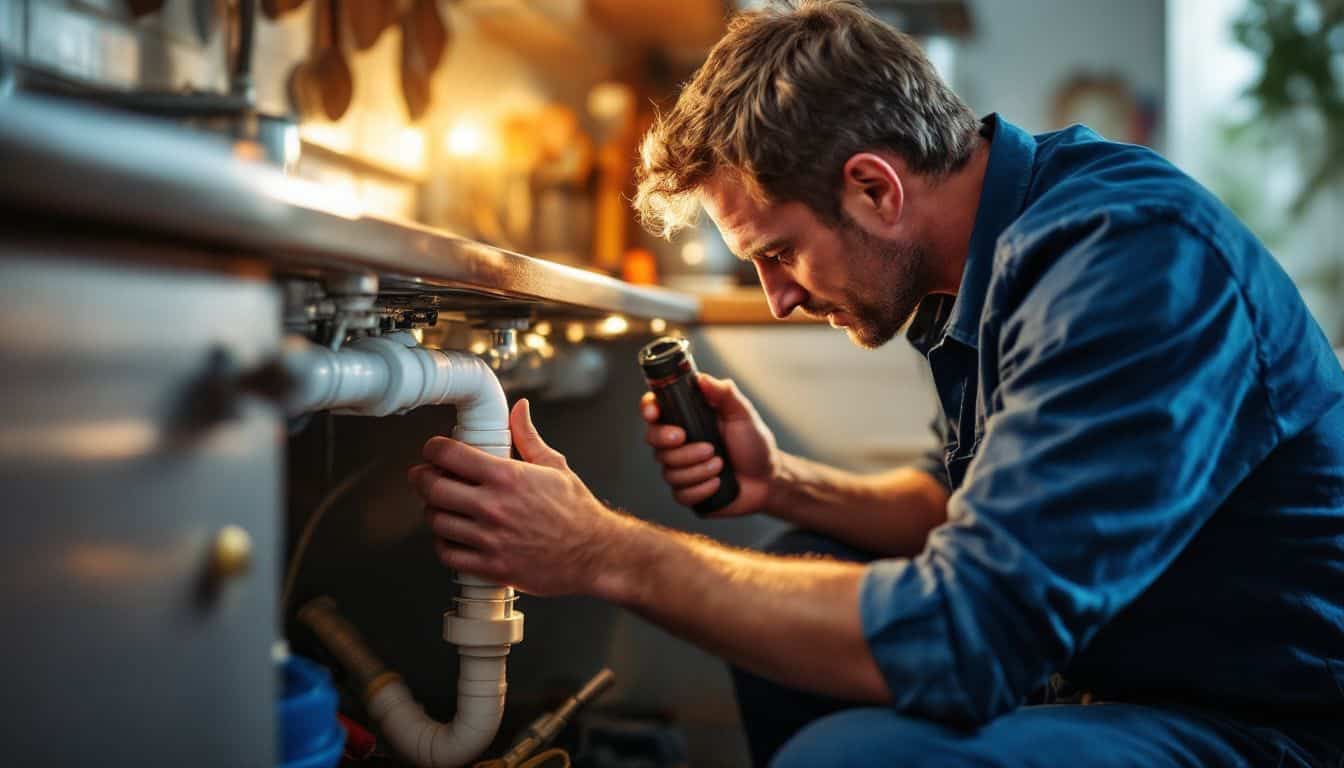
After fixing serious backflow issues, you might still hear strange noises from your pipes. Those gurgling sounds from your sink or tub spell trouble. The noise happens because water can’t flow freely through your drains.
Air gets trapped, creating bubbles that make those weird sounds you hear.
Your drain vents might need work – they’re supposed to let air flow smoothly through the pipes. I learned this the hard way when my kitchen sink started making sounds like a stomach growling.
The fix isn’t always simple. Bad cases might need new drain pipes. A plumber can check your vents and clear any blocks that trap air in the system. Don’t ignore these sounds – they often lead to bigger drain problems down the road.
Complete Loss of Water
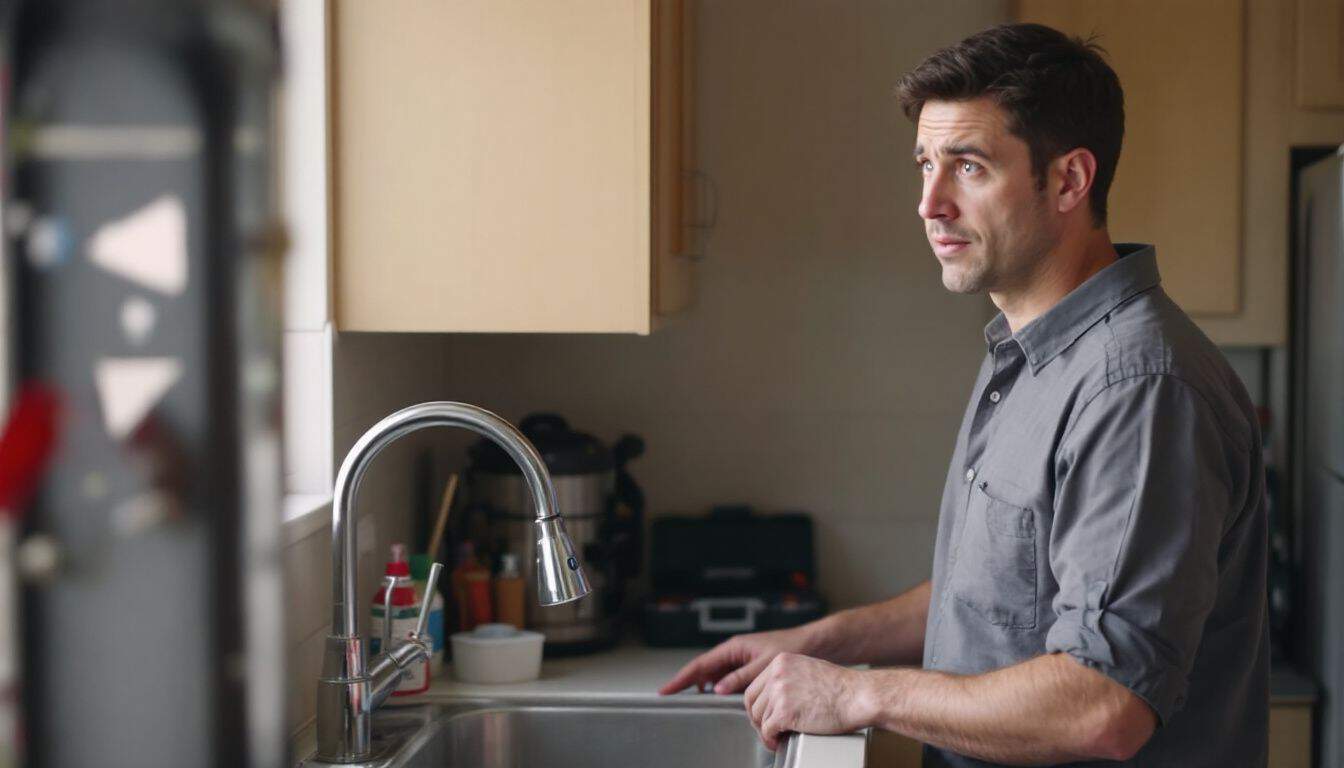
While gurgling pipes signal trouble, a complete loss of water means serious business. No water flowing through your pipes creates major headaches for your daily routine. The sudden silence of your faucets points to three main culprits: frozen pipes, nasty clogs, or hidden leaks in your plumbing system.
Your home’s water pressure might drop without warning – that’s your first red flag. Frozen pipes often strike during cold snaps, while clogs build up slowly over time. A burst pipe can flood your basement in minutes, causing expensive water damage.
Smart guys call a plumber right away instead of playing detective. Your plumbing system needs quick fixes to restore water service and stop further damage to your home.
No Hot Water Available
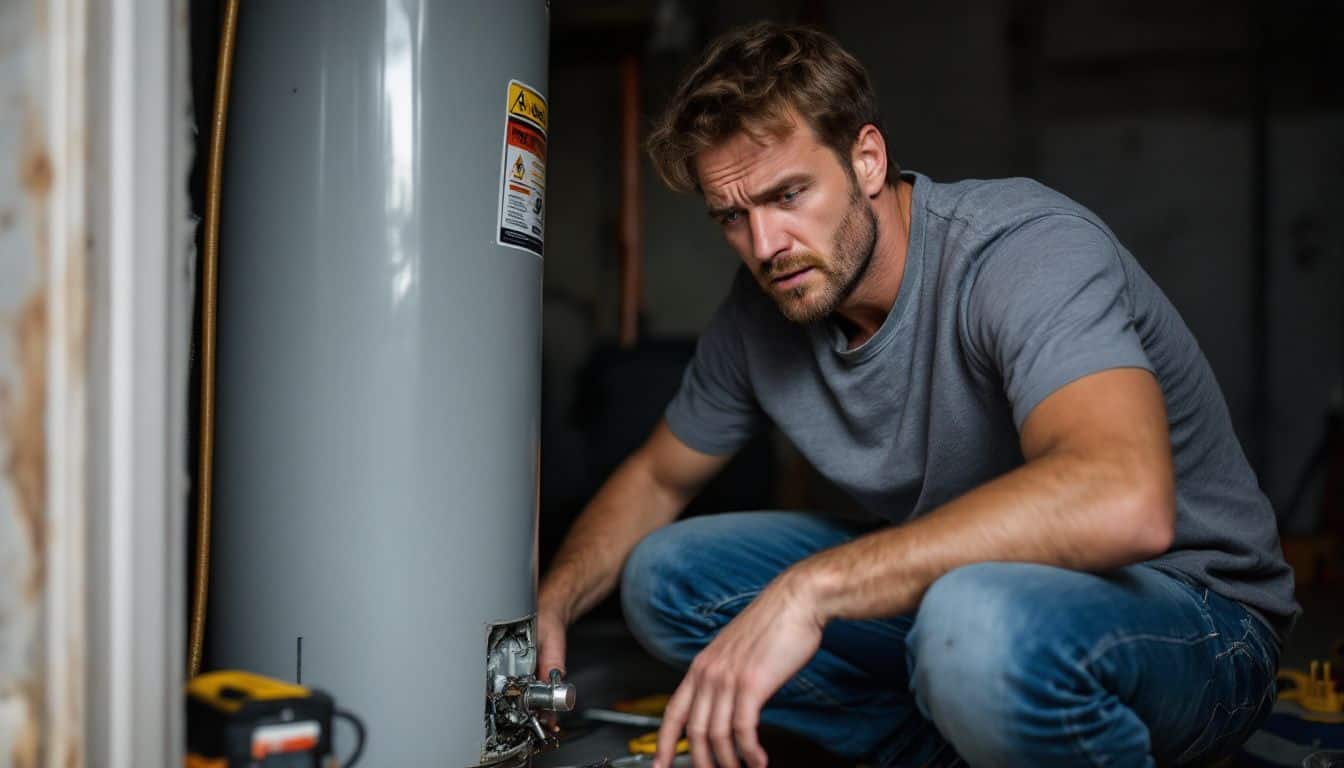
No hot water means more than just cold showers. Your water heater might have serious issues that need fixing right away. The problem often starts with a broken pilot light in gas heaters or a failed heating element.
Most guys try to tough it out with cold water, but this can signal bigger troubles with your plumbing system.
A faulty water heater needs quick action from a pro. Your morning routine shouldn’t include ice-cold showers or waiting forever for hot water at the sink. Bad news – trying to fix complex water heater problems yourself could make things worse or create safety risks.
Good news – a skilled plumber can spot the exact issue, whether it’s a pilot light problem or a dying heating element. Speaking of safety risks, let’s talk about another major warning sign: burst pipe emergencies….
Burst Pipe Emergencies
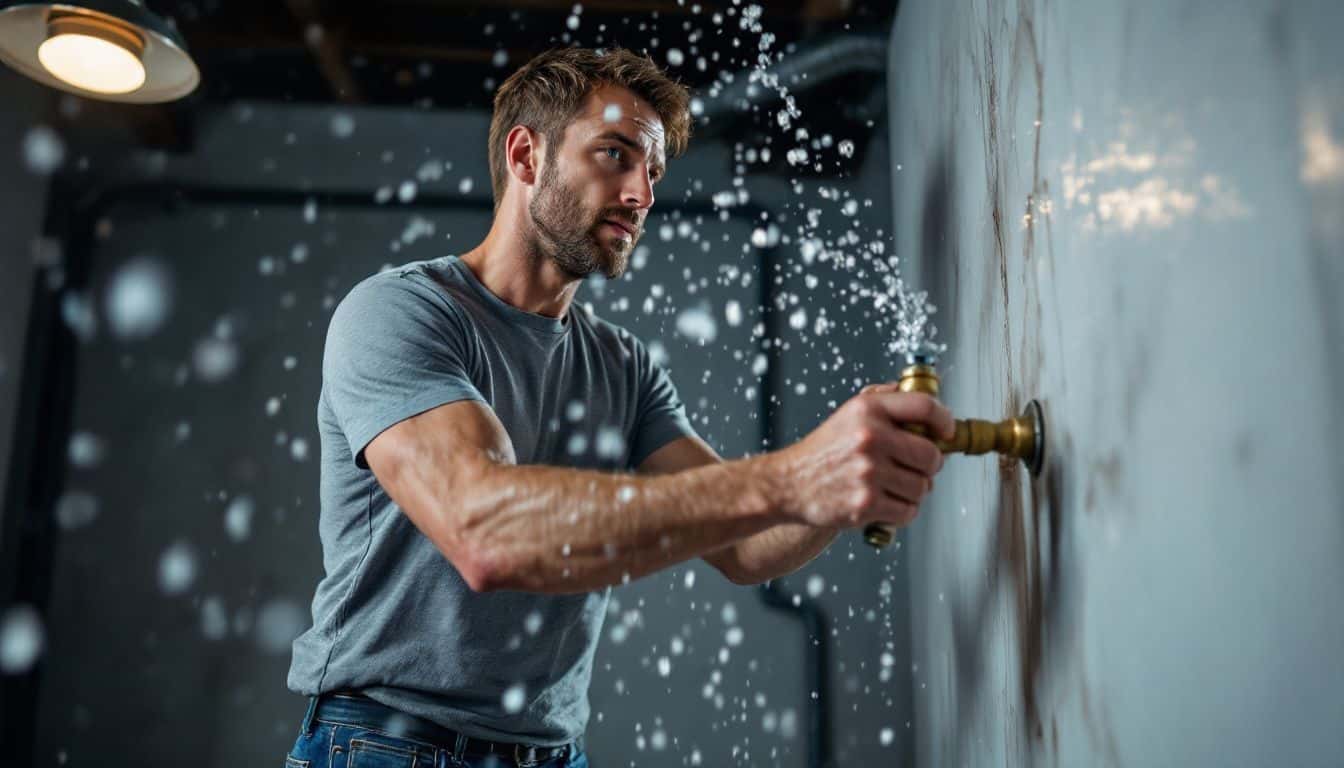 Burst pipes spell big trouble – especially during winter’s freezing grip. A single crack can spray hundreds of gallons of water into your home within hours. I learned this the hard way last winter when my basement pipe burst.
Burst pipes spell big trouble – especially during winter’s freezing grip. A single crack can spray hundreds of gallons of water into your home within hours. I learned this the hard way last winter when my basement pipe burst.
The first signs? Strange sounds from the walls and wet spots on the ceiling. Quick action saved my home from major water damage. You must shut off your main water valve right away during a plumbing emergency.
A burst pipe can release up to 250 gallons per hour – enough to fill a swimming pool in days.
Frozen pipes
Your plumbing system needs immediate attention if you spot these signs. Turn off the water supply first, then call a pro. Those chemical drain cleaners won’t help with this one. Trust me – I’ve tried band-aid fixes before, and they only led to bigger headaches.
Toilet-Related Plumbing Concerns
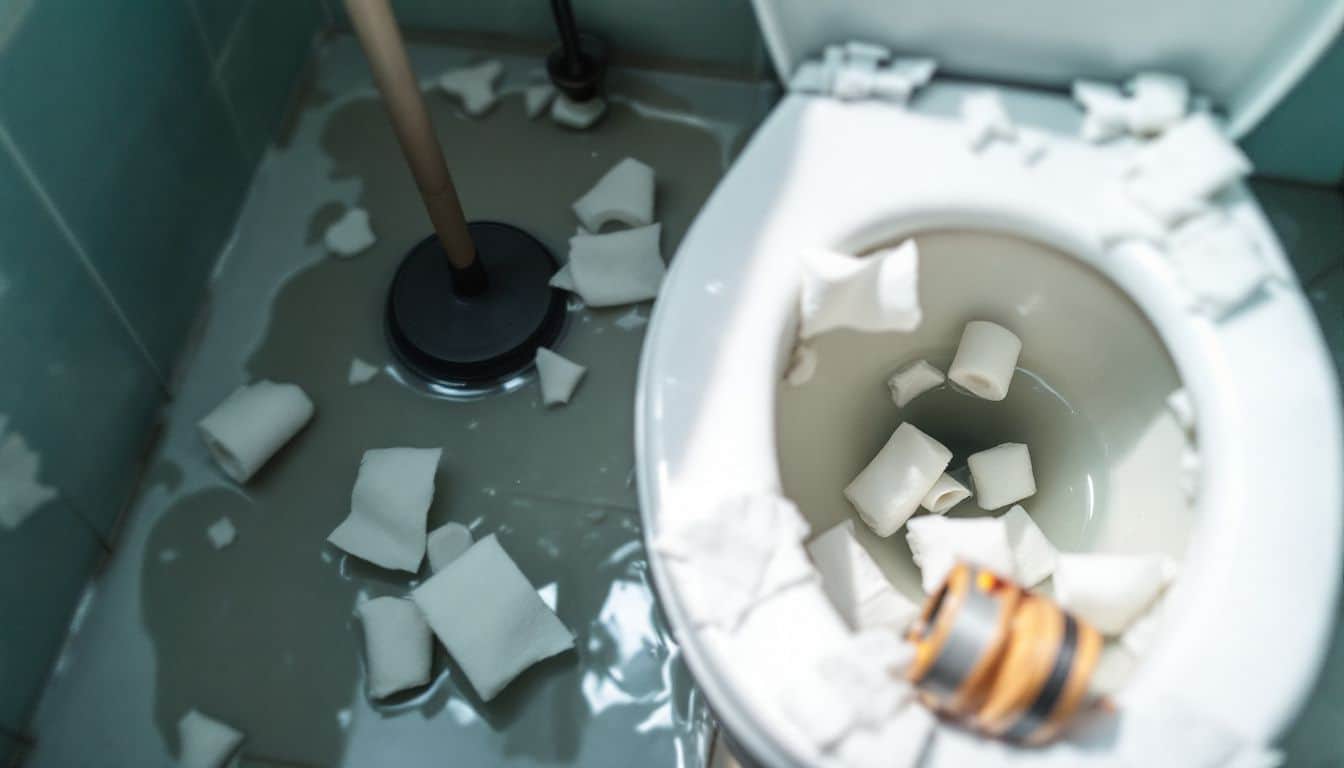
Your toilet acts as the daily MVP of your home’s plumbing system – and when it starts acting up with strange noises, bad smells, or stubborn clogs, you’ll want to keep reading to learn the red flags that signal it’s time to call in the pros.
Continuous Running Toilet
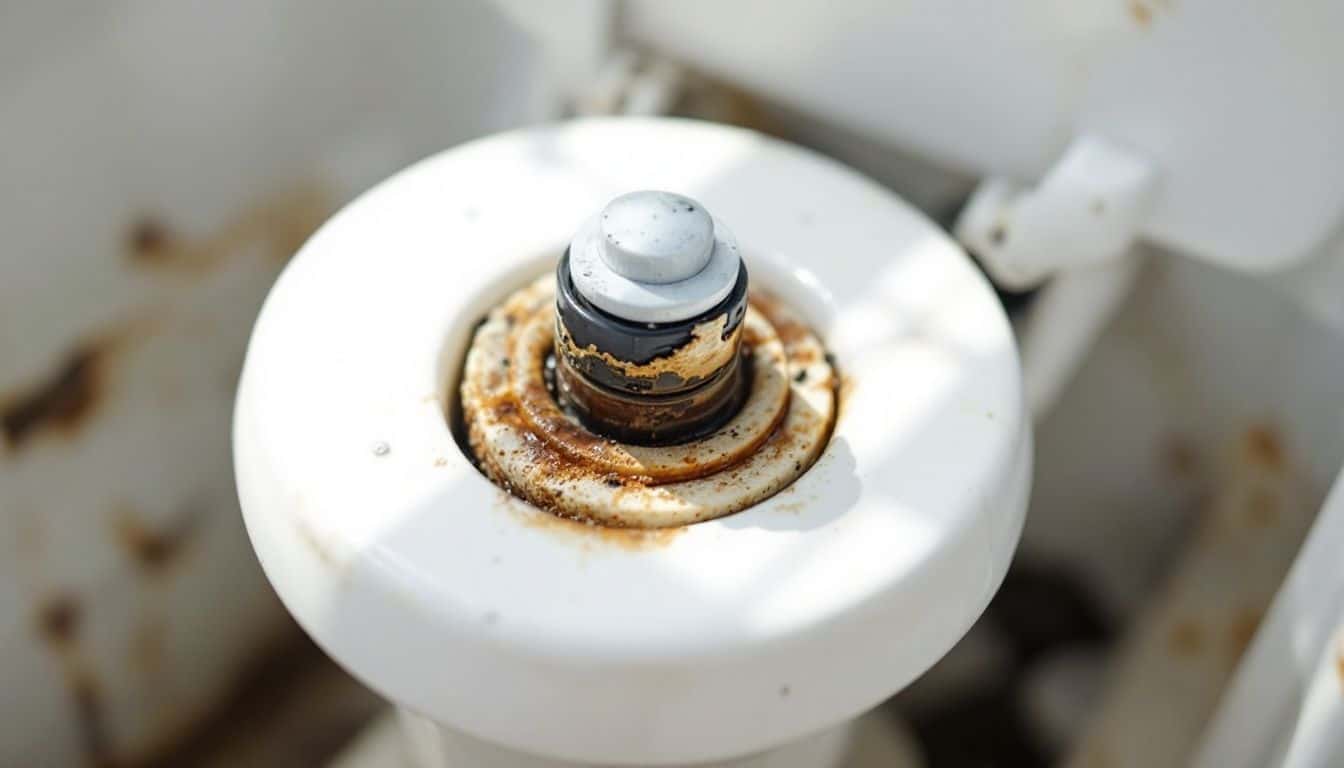
A running toilet drains money straight from your wallet. The constant flow of water leads to sky-high bills – I learned this the hard way last summer. Most often, a faulty flapper valve causes this headache.
This small rubber piece controls water flow between the tank and bowl, and once it wears out, water keeps running non-stop.
The fix might be simpler than you think. A quick check of the fill valve and water pressure could reveal the culprit. Mineral buildup often messes with these parts, but a good descaling solution cleans things right up.
I’ve saved countless friends from expensive plumber visits by showing them how to adjust their flapper valves. Still, if you spot water damage or hear strange noises from your toilet, it’s time to call a pro – some problems need expert hands.
Overflowing Toilet
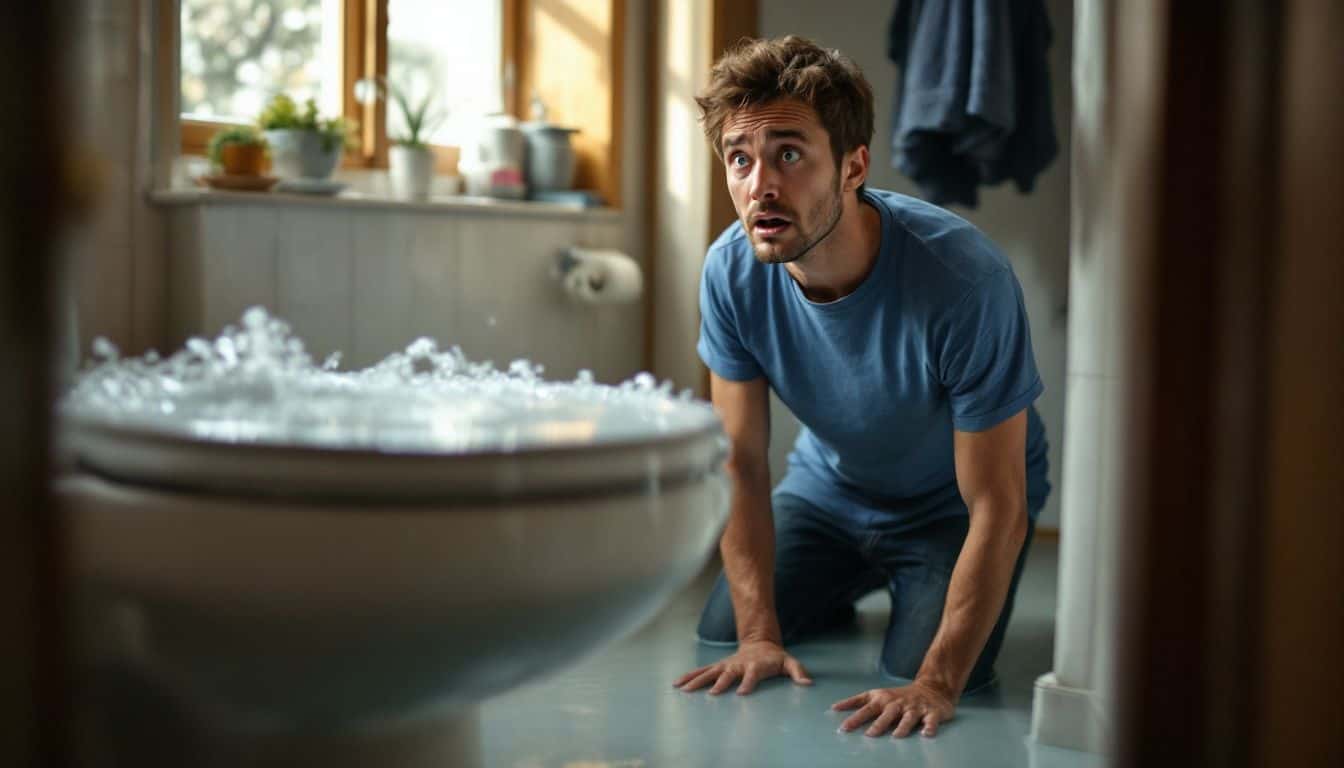
An overflowing toilet ranks high on every homeowner’s nightmare list. Raw sewage spilling onto your bathroom floor creates instant panic – I’ve been there! The most common culprits include a broken float mechanism or stubborn clogs in your pipes.
Your first move should be grabbing that trusty plunger from under the sink.
The difference between a small problem and a big disaster is often just minutes of delayed action.
Toilet clogs need quick action to stop water damage and health risks. If your plunger fails to clear the blockage, don’t waste time with DIY tricks. Backed-up sewage poses serious health dangers to your family.
Grab your phone and call a pro plumber right away. Those toilet snakes and closet augers at the hardware store might look tempting, but amateur fixes often make things worse. Bad clogs can damage your sewer line or vent pipe system – repairs that’ll cost way more than a plumber’s visit.
Toilet Blockage by Foreign Items
Foreign items in your toilet spell big trouble. Kids love to flush toys down the toilet – trust me, I’ve fished out countless rubber ducks from angry toilets. Dental floss, baby wipes, and sanitary napkins create nasty clogs that no plunger can fix.
Low-flow toilets face even bigger risks because they use less water to flush.
Your toilet isn’t a trash can. Hard water builds up mineral deposits, making clogs worse over time. The sewage system only handles toilet paper – nothing else. Flushing paper towels or too much toilet paper leads to major blockages.
Bad smells from your toilet bowl might signal trapped items causing a backup in your plumbing systems. Let’s look at why DIY fixes sometimes fall short of solving these problems.
Bad Odor from Toilet
Bad smells from your toilet spell trouble. Your toilet’s P-trap blocks sewer gases from entering your home. Empty P-traps in unused toilets let these nasty odors escape. Mold growth behind toilet walls adds to the stink.
A broken wax ring or clogged vent pipe traps these gases inside your bathroom.
Quick fixes won’t solve lasting toilet odors. Bad smells often point to deeper plumbing issues that need expert help. Sewer gases can make you sick, so don’t ignore that ammonia-like scent.
A plumbing snake might clear simple clogs, but damaged seals need professional repair. Your nose knows best – if something smells off, call a pro before small problems become big headaches.
Limits of DIY Plumbing Fixes
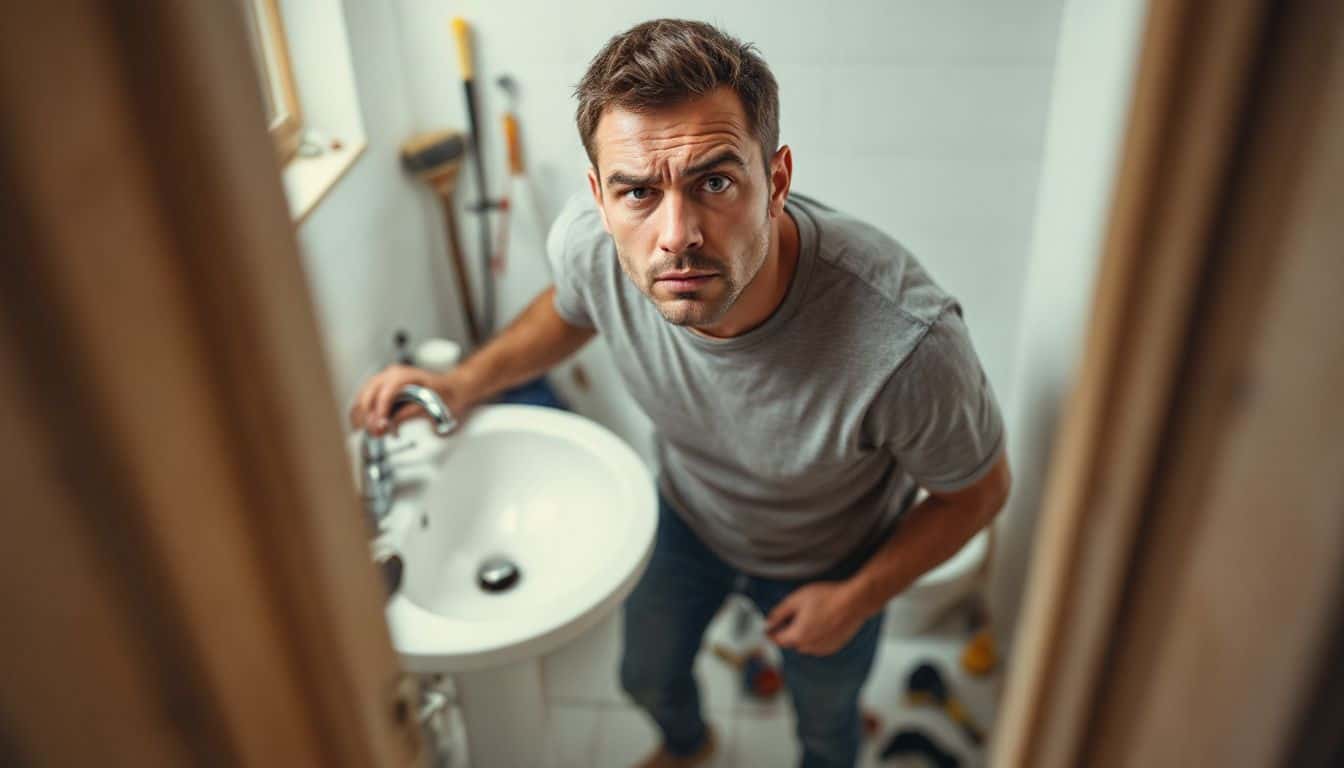
Sometimes DIY fixes just won’t cut it – especially when your plunger fails three times in a row. You’ll save more money and time by calling a pro right away instead of buying tools that might not solve the real problem.
Plunger Failures
Your trusty plunger isn’t always the hero you need for tough clogs. Most guys learn this the hard way after flooding their bathroom floor with a failed plunger attempt.
- A basic plunger can’t fix deep clogs in your main sewer line. These clogs often need a professional drain snake to break them up. I once spent two hours with a plunger before calling a pro who fixed it in 15 minutes.
- Plungers fail when dealing with solid objects stuck in toilets. Kids’ toys, feminine hygiene products, or other items need special tools for removal. The plunger just pushes them deeper.
- Multiple clogged drains point to bigger problems. If your kitchen sink, toilet, and shower drain slowly at once, you likely have septic system issues. No plunger can solve that.
- Broken seals between your toilet and floor make plunging useless. The force just pushes water out the bottom instead of clearing the clog. You’ll spot water pooling around your toilet base.
- Hard mineral buildup in pipes resists plunger force. These deposits narrow your pipes over time and need professional cleaning tools to remove them.
- Plunging too hard can damage old pipes or weak connections. The pressure might crack pipes or loosen joints, leading to leaks inside your walls.
- Recurring clogs after successful plunging signal deeper issues. Your pipes might have tree root invasion or collapsed sections that need immediate repair.
- Air vents blocked by debris make plungers ineffective. Your plumbing needs proper airflow to work right. Blocked vents cause gurgling sounds and slow drains.
Recurring Slow Drains
Slow drains can turn into a major plumbing disaster if left unchecked. Most guys try quick fixes, but recurring drain issues need serious attention.
- A slow drain often points to a growing clog in your main sewer line. Soap scum, hair, and grease build up over time, making water flow slower each day.
- Strange gurgling sounds from your sink or tub mean trapped air in the pipes. This happens when water can’t flow freely through clogged sections.
- Multiple slow drains in your house signal a bigger problem. If both your kitchen sink and dishwasher drain slowly, the main line probably needs cleaning.
- Bad smells from drains show bacteria growth in stuck debris. These odors won’t go away with just drain cleaner – they need professional cleaning.
- Higher water bills often come from slow drains. Pipes work harder to push water through clogs, wasting energy and money.
- Store-bought cleaners only fix surface clogs. Deep blockages need special tools that only plumbers have.
- Plunger use more than twice a week means the clog keeps coming back. Professional drain cleaning removes the whole blockage, not just parts of it.
- Slow drains can damage your pipes over time. Water sitting in pipes causes rust and weakens joints.
- Regular maintenance stops most recurring clogs. A plumber can spot problems before they get worse.
- Simple habits help prevent future clogs. Running hot water after each drain use keeps pipes cleaner longer.
Overflow Crisis in Toilets
A toilet overflow can quickly turn your bathroom into a disaster zone. Your quick action makes the difference between a minor issue and major water damage.
- Watch for rising water levels in the bowl. The water should never reach higher than one inch below the rim.
- Stop flushing right away if you spot trouble. Each flush adds more water to an already bad situation.
- Turn off the water supply valve near the toilet base. This simple step stops more water from flowing into the bowl.
- Clear basic clogs with a plunger. Push and pull firmly to create suction that breaks up blockages.
- Look for items that shouldn’t be in toilets. Things like tampons or paper towels often cause major backups.
- Check if multiple drains act up at once. This points to a bigger sewer line problem.
- Listen for gurgling sounds in nearby sinks. These noises signal serious drainage issues.
- Grab old towels to soak up water fast. Quick cleanup helps prevent floor damage.
- Open windows to air out unsanitary conditions. Good airflow reduces bad smells and health risks.
- Call a pro if DIY fixes fail twice. Repeat problems need expert attention.
- Ask about preventative maintenance plans. Regular checks stop future overflow disasters.
- Document any water damage for insurance. Take photos before cleanup starts.
- Schedule HVAC inspection if basement flooding occurs. Backed-up water can harm other home systems.
People Also Ask
Why won’t my toilet flush properly?
A stubborn toilet that won’t flush right could mean trouble. If you’ve tried plunging and your clogged toilet still acts up, it’s time to call a pro. Don’t wait until it gets worse!
What’s that banging noise in my pipes?
That loud banging sound, called water hammer, isn’t normal. It happens when water flow stops suddenly. This noise means your pipes need help fast. A plumber can fix this before your pipes break.
Why is my sink draining so slowly?
Slow draining is like a warning bell. When water pools in your sink or takes forever to go down, you’ve got a clog building up. If store-bought fixes don’t work, you need a plumber’s tools and know-how.
Should I try fixing a clogged toilet myself?
While you can try a plunger first, some clogs won’t budge. If your toilet keeps acting up after you’ve tried the basics, stop! You might make things worse. That’s when you need a pro’s help to avoid a mess.
References
https://masterrooter.com/12-signs-its-time-to-call-a-local-plumber/ (2022-05-26)
https://www.cardinalplumbingva.com/blog/most-common-causes-of-low-water-pressure/
https://masterrooter.com/should-i-call-a-plumber-11-signs-its-time/
https://www.theyesmancan.com/blog/top-reasons-call-emergency-plumber/ (2023-05-11)
https://www.peaden.com/blog/plumbing-service/when-to-call-a-plumber/ (2018-06-28)
https://www.rheem.com/water-heating/articles/7-signs-you-need-to-call-a-plumber/
https://www.honestairconditioning.biz/blog/running-toilet-causes-fixes-and-when-to-call-a-plumber/
https://rightnowheatcool.com/blog/when-to-call-a-plumber-for-a-clogged-toilet/ (2024-07-16)
https://www.boothehvac.com/blog/clogged-toilet-when-to-call-plumber/
https://5-starplumbing.com/bad-smell-coming-from-toilet-9-most-common-causes-solutions/
https://bellbroshvac.com/blog/tell-plumbing-bad-signs-symptoms-failing-pipes/
https://bredahlplumbing.com/2023/06/toilet-overflow-solutions-when-to-call-a-plumber/ (2024-03-21)
